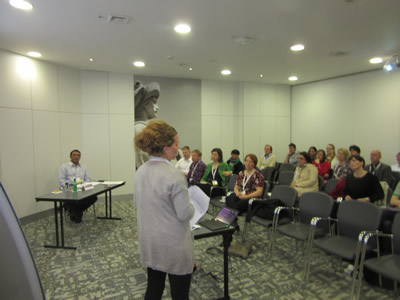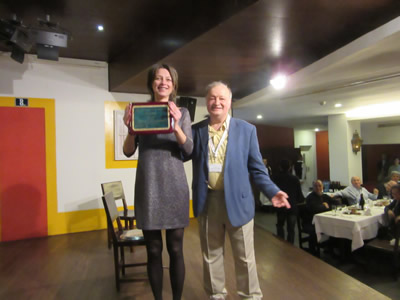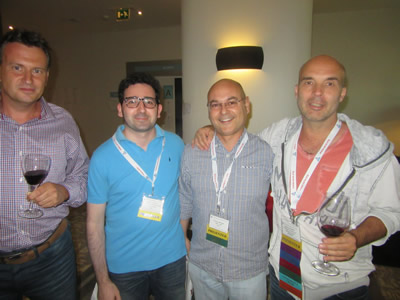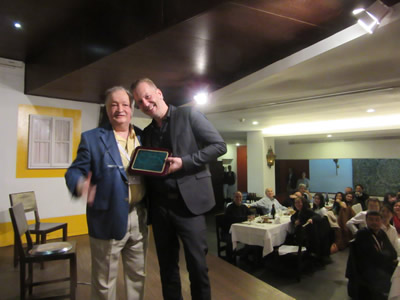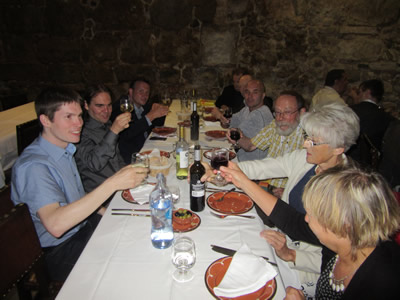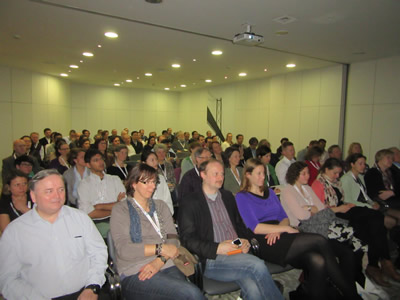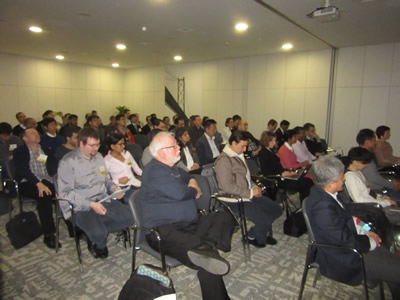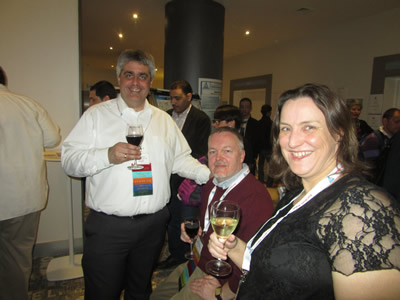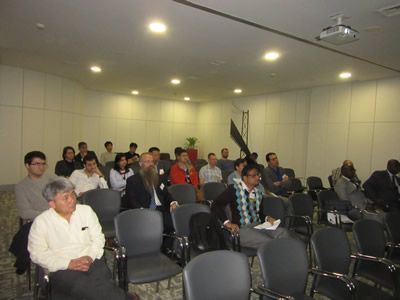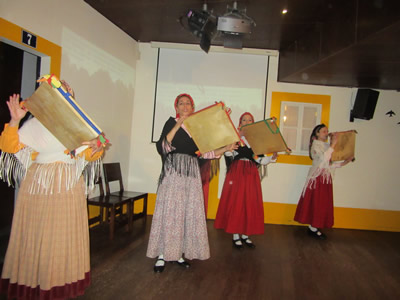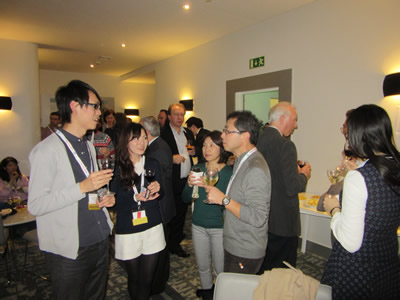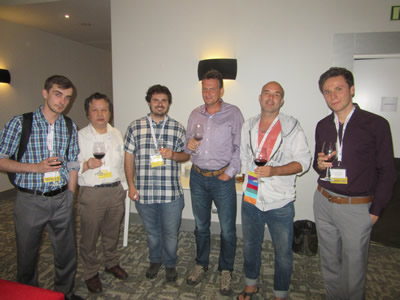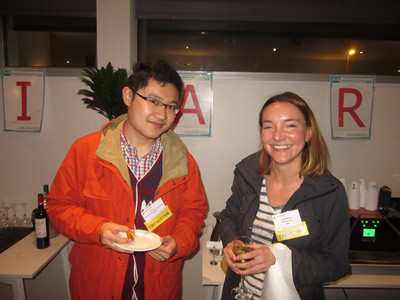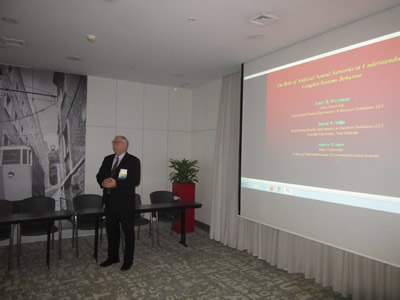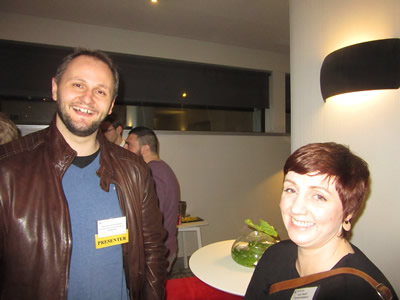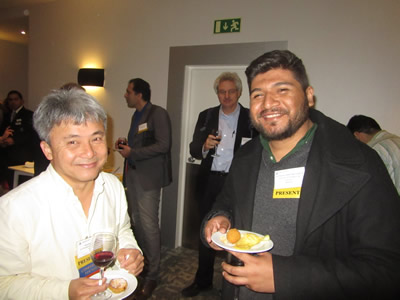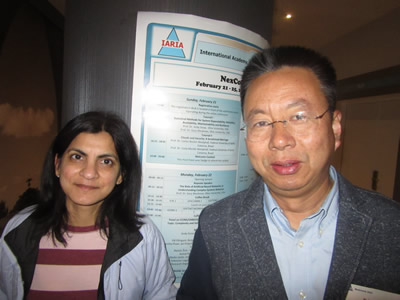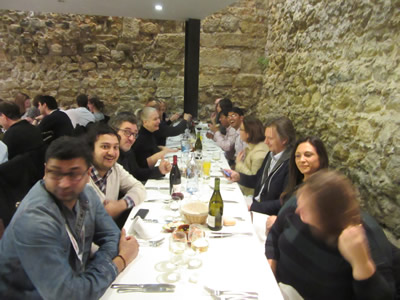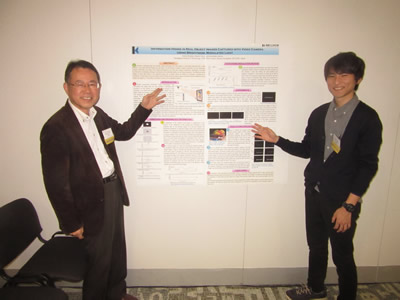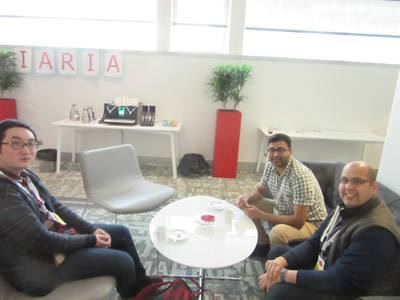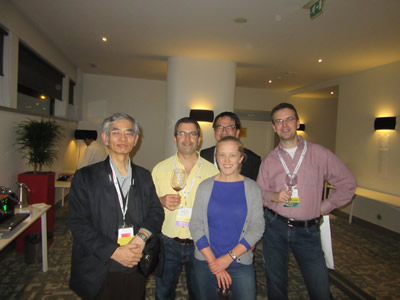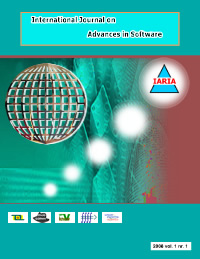ICCGI 2025 - The Twentieth International Multi-Conference on Computing in the Global Information Technology
March 09, 2025 - March 13, 2025
ICCGI 2025
Onsite and Online Options: In order to accommodate various situations, we are offering the option for either physical presence or virtual participation (pdf slides or pre-recorded videos).
ISSN: 2308-4529
ISBN: 978-1-68558-231-9
ICCGI 2025 is colocated with the following events as part of InfoWare 2025 Congress:
- ICCGI 2025, The Twentieth International Multi-Conference on Computing in the Global Information Technology
- ICWMC 2025, The Twenty-First International Conference on Wireless and Mobile Communications
- VEHICULAR 2025, The Fourteenth International Conference on Advances in Vehicular Systems, Technologies and Applications
- INTERNET 2025, The Seventeenth International Conference on Evolving Internet
- COLLA 2025, The Fifteenth International Conference on Advanced Collaborative Networks, Systems and Applications
- INTELLI 2025, The Fourteenth International Conference on Intelligent Systems and Applications
- VISUAL 2025, The Tenth International Conference on Applications and Systems of Visual Paradigms
- HUSO 2025, The Eleventh International Conference on Human and Social Analytics
- BRAININFO 2025, The Tenth International Conference on Neuroscience and Cognitive Brain Information
ICCGI 2025 Steering Committee
|
 |
Constantin Paleologu
Polytechnic University of Bucharest
Romania
|
|
 |
Peter Kieseberg
St. Pölten University of Applied Sciences
Austria
|
|
 |
Yasushi Kambayashi
Sanyo-Onoda City University
Japan
|
|
 |
Ulrich Reimer
University of Applied Sciences St. Gallen
Switzerland
|
|
 |
Kathryn E. Stecke
University of Texas at Dallas
USA
|
|
 |
Juho Mäkiö
Hochschule Emden / Leer
Germany
|
|
 |
Constantin Paleologu
Polytechnic University of Bucharest
Romania
|
|
 |
Peter Kieseberg
St. Pölten University of Applied Sciences
Austria
|
|
 |
Yasushi Kambayashi
Sanyo-Onoda City University
Japan
|
|
 |
Ulrich Reimer
University of Applied Sciences St. Gallen
Switzerland
|
|
 |
Kathryn E. Stecke
University of Texas at Dallas
USA
|
|
 |
Juho Mäkiö
Hochschule Emden / Leer
Germany
|
ICCGI 2025 conference tracks:
Digital society trends
Security context in the public and private organizations; Cybersecurity risks; Smart home security and privacy; Security awareness; Digital forensics; Large e-Commerce; Digital crowdfunding platforms; Social intelligence; Social computing; Online knowledge sharing; Opinion diversity and crowd performance; Social media capability; Emergency management social media; Digital accessibility and wearable technologies; Social inclusion; Digital social movements; Digital urban services; Digital healthcare services; Online communities; Online shopping; Social commerce acceptance; Digital multi-modal transport systems and crowdsensing; Mobile technologies and self-healthcare; Online education; Negative online effects on healthcare; Virtual communities and collaboration; Crowdsourcing; Voluntary professional associations; Big social data; e-Government services; Ethical considerations
Trends in information systems (IS)
Information-based and knowledge-based in business and society; IS socio-technical concepts; Organizational agility; Collaborative software development; Knowledge transfer; Organizational culture; Business process outsourcing; Internet of Things and research for information systems; Crowd wisdom in IS; Mining and analyzing Big data; Competitive use of information technology; Cloud-based IS and business flexibility; IS online evaluation; IS resilience; Anonymous Q&A IS platforms; User-centric IS; Human-centered situation awareness IS; Consumer-level neuro-devices and IS; IS Pedagogy 2.0; Information security policy compliance; Visualizing mental learning processes; Task-adaptive IS; Enterprise management systems; Global and scalable IS
Industrial systems
Control theory and systems; Fault-tolerance and reliability; Data engineering; Enterprise computing and evaluation; Electrical and electronics engineering; Economic decisions and information systems; Advanced robotics; Virtual reality systems; Industrial systems and applications; Industrial and financial systems; Industrial control electronics; Industrial IT solutions
Evolutionary computation
Algorithms, procedures, mechanisms and applications; Computer architecture and systems; Computational sciences; Computation in complex systems; Computer and communication systems; Computer networks; Computer science theory; Computation and computer security; Computer simulation; Digital telecommunications; Distributed and parallel computing; Computation in embedded and real-time systems; Soft computing; User-centric computation
Autonomic and autonomous systems
Automation and autonomous systems; Theory of Computing; Autonomic computing; Autonomic networking; Network computing; Protecting computing; Theories of agency and autonomy; Multi-agent evolution, adaptation and learning; Adjustable and self-adjustable autonomy; Pervasive systems and computation; Computing with locality principles; GRID networking and services; Pervasive computing; Cluster computing and performance; Artificial intelligence Computational linguistics; Cognitive technologies; Decision making; Evolutionary computation; Expert systems; Computational biology
Bio-technologies
Models and techniques for biometric technologies; Bioinformatics; Biometric security; Computer graphics and visualization; Computer vision and image processing; Computational biochemistry; Finger, facial, iris, voice, and skin biometrics; Signature recognition; Multimodal biometrics; Verification and identification techniques; Accuracy of biometric technologies; Authentication smart cards and biometric metrics; Performance and assurance testing; Limitations of biometric technologies; Biometric card technologies; Biometric wireless technologies; Biometric software and hardware; Biometric standards
Knowledge data systems
Data mining and Web mining; Knowledge databases and systems; Data warehouse and applications; Data warehousing and information systems; Database performance evaluation; Semantic and temporal databases; Database systems Databases and information retrieval; Digital library design; Meta-data modeling
Mobile and distance education
Human computer interaction; Educational technologies; Computer in education; Distance learning; E-learning; Mobile learning Cognitive support for learning; Internet-based education; Impact of ICT on education and society; Group decision making and software; Habitual domain and information technology; Computer-mediated communications; Immersing authoring; Contextual and cultural challenges in user mobility; Learning process of digital nationality; M-learning's function in business training and in higher education
Intelligent techniques, logics, and systems
Intelligent agent technologies; Intelligent and fuzzy information processing; Intelligent computing and knowledge management; Intelligent systems and robotics; Fault-tolerance and reliability; Fuzzy logic & systems; Genetic algorithms; Haptic phenomena; Graphic recognition; Neural networks; Symbolic and algebraic computation; Modeling, simulation and analysis of business processes and systems
Knowledge processing
Knowledge representation models; Knowledge languages; Cognitive science; Knowledge acquisition; Knowledge engineering; Knowledge processing under uncertainty; Machine intelligence; Machine learning; Making decision through Internet; Networking knowledge plan
Information technologies
Information technology and organizational behavior; Agents, data mining and ontologies; Information retrieval systems; Information and network security; Information ethics and legal evaluations; Optimization and information technology; Organizational information systems; Information fusion; Information management systems; Information overload; Information policy making; Information security; Information systems; Information discovery; Content-consumer IT applications for mobile platforms; New ICT-based applications in the digital society; Micro-contents' function on the way of the Web 3.0
Internet and web technologies
Internet and WWW-based computing; Web and Grid computing; Internet service and training; IT and society; IT in education and health; Management information systems; Visualization and group decision making; Web based language development; Web search and decision making; Web service ontologies; Scientific web intelligence; Online business and decision making; Business rule language; E-Business; E-Commerce; Online and collaborative work; Social eco-systems and social networking; Social decisions on Internet; Computer ethics
Digital information processing
Mechatronics; Natural language processing; Medical imaging; Image processing; Signal processing; Speech processing; Video processing; Pattern recognition; Pattern recognition models; Graphics & computer vision; Medical systems and computing
Cognitive science and knowledge agent-based systems
Cognitive support for e-learning and mobile learning; Agents and cognitive models; Agents & complex systems; computational ecosystems; Agent architectures, perception, action & planning in agents; Agent communication: languages, semantics, pragmatics & protocols; Agent-based electronic commerce and trading systems Multi-agent constraint satisfaction; Agent programming languages, development environments and testbeds; Computational complexity in autonomous agents; Multi-agent planning and cooperation; Logics and formal models of for agency verification; Nomadic agents; Negotiation, auctions, persuasion; Privacy and security issues in multi-agent systems
Mobility and multimedia systems
Mobile communications; Multimedia and visual programming; Multimedia and decision making; Multimedia systems; Mobile multimedia systems; User-centered mobile applications; Designing for the mobile devices; Contextual user mobility; Mobile strategies for global market; Interactive television and mobile commerce
Systems performance
Performance evaluation; Performance modeling; Performance of parallel computing; Reasoning under uncertainty; Reliability and fault-tolerance; Performance instrumentation; Performance monitoring and corrections; Performance in entity-dependable systems; Real-time performance and near-real time performance evaluation; Performance in software systems; Performance and hybrid systems; Measuring performance in embedded systems
Networking and telecommunications
Telecommunication and Networking; Telecommunication Systems and Evaluation; Multiple Criteria Decision Making in Information Technology; Network and Decision Making; Networks and Security; Communications protocols (SIP/H323/MPLS/IP); Specialized networks (GRID/P2P/Overlay/Ad hoc/Sensor); Advanced services (VoIP/IPTV/Video-on-Demand; Network and system monitoring and management; Feature interaction detection and resolution; Policy-based monitoring and managements systems; Traffic modeling and monitoring; Traffic engineering and management; Self-monitoring, self-healing and self-management systems; Man-in-the-loop management paradigm
Software development and deployment
Software requirements engineering; Software design, frameworks, and architectures; Software interactive design; Formal methods for software development, verification and validation; Neural networks and performance; Patterns/Anti-patterns/Artifacts/Frameworks; Agile/Generic/Agent-oriented programming; Empirical software evaluation metrics; Software vulnerabilities; Reverse engineering; Software reuse; Software security, reliability and safety; Software economics; Software testing and debugging; Tracking defects in the OO design; Distributed and parallel software; Programming languages; Declarative programming; Real-time and embedded software; Open source software development methodologies; Software tools and deployment environments; Software Intelligence; Software Performance and Evaluation
Knowledge virtualization
Modeling techniques, tools, methodologies, languages; Model-driven architectures (MDA); Service-oriented architectures (SOA); Utility computing frameworks and fundamentals; Enabled applications through virtualization; Small-scale virtualization methodologies and techniques; Resource containers, physical resource multiplexing, and segmentation; Large-scale virtualization methodologies and techniques; Management of virtualized systems; Platforms, tools, environments, and case studies; Making virtualization real; On-demand utilities Adaptive enterprise; Managing utility-based systems; Development environments, tools, prototypes
Systems and networks on the chip
Microtechnology and nanotechnology; Real-time embedded systems; Programming embedded systems; Controlling embedded systems; High speed embedded systems; Designing methodologies for embedded systems; Performance on embedded systems; Updating embedded systems; Wireless/wired design of systems-on-the-chip; Testing embedded systems; Technologies for systems processors; Migration to single-chip systems
Context-aware systems
Context-aware autonomous entities; Context-aware fundamental concepts, mechanisms, and applications; Modeling context-aware systems; Specification and implementation of awareness behavioral contexts; Development and deployment of large-scale context-aware systems and subsystems; User awareness requirements Design techniques for interfaces and systems; Methodologies, metrics, tools, and experiments for specifying context-aware systems; Tools evaluations, Experiment evaluations
Networking technologies
Next generation networking; Network, control and service architectures; Network signalling, pricing and billing; Network middleware; Telecommunication networks architectures; On-demand networks, utility computing architectures; Next generation networks [NGN] principles; Storage area networks [SAN]; Access and home networks; High-speed networks; Optical networks; Peer-to-peer and overlay networking; Mobile networking and systems; MPLS-VPN, IPSec-VPN networks; GRID networks; Broadband networks
Security in network, systems, and applications
IT in national and global security; Formal aspects of security; Systems and network security; Security and cryptography; Applied cryptography; Cryptographic protocols; Key management; Access control; Anonymity and pseudonymity management; Security management; Trust management; Protection management; Certification and accreditation; Virii, worms, attacks, spam; Intrusion prevention and detection; Information hiding; Legal and regulatory issues
Knowledge for global defense
Business continuity and availability; Risk assessment; Aerospace computing technologies; Systems and networks vulnerabilities; Developing trust in Internet commerce; Performance in networks, systems, and applications; Disaster prevention and recovery; IT for anti-terrorist technology innovations (ATTI); Networks and applications emergency services; Privacy and trust in pervasive communications; Digital rights management; User safety and protection
Information Systems [IS]
Management Information Systems; Decision Support Systems; Innovation and IS; Enterprise Application Integration; Enterprise Resource Planning; Business Process Change; Design and Development Methodologies and Frameworks; Iterative and Incremental Methodologies; Agile Methodologies; IS Standards and Compliance Issues; Risk Management in IS Design and Development; Research Core Theories; Conceptualisations and Paradigms in IS; Research Ontological Assumptions in IS Research; IS Research Constraints, Limitations and Opportunities; IS vs Computer Science Research; IS vs Business Studies
IPv6 Today - Technology and deployment
IP Upgrade - An Engineering Exercise or a Necessity?; Worldwide IPv6 Adoption - Trends and Policies; IPv6 Programs, from Research to Knowledge Dissemination; IPv6 Technology - Practical Information; Advanced Topics and Latest Developments in IPv6; IPv6 Deployment Experiences and Case Studies; IPv6 Enabled Applications and Devices
Modeling
Continuous and discrete Models; Optimal Models; Complex System Modeling; Individual-Based Models; Modeling Uncertainty; Compact fuzzy models; Modeling languages; Real-time modeling; Performance modeling; Decision support systems; Multiple criteria decision aiding; Problem structuring methods
Optimization
Multicriteria Optimization; Multilervel Optimization; Goal Programming; Optimization and Efficiency; Optimization-based decisions; Evolutionary Optimization; Self-Optimization; Extreme Optimization; Combinatorial Optimization; Disccrete Optimization; Fuzzy Optimization; Lipschitzian Optimization; Non-Convex Optimization; Convexity; Continuous Optimization; Interior point methods; Semidefinite and Conic Programming
Complexity
Complexity Analysis; Computational Complexity; Complexity Reduction; Optimizing Model Complexity; Communication Complexity; Managing Complexity; Modeling Complexity in Social Systems; Low-complexity Global Optimization; Software Development for Modeling and Optimization; Industrial applications
Deadlines:
Submission | Nov 22, 2024 |
Notification | Jan 06, 2025 |
Registration | Jan 19, 2025 |
Camera ready | Feb 02, 2025 |
Deadlines differ for special tracks. Please consult the conference home page for special tracks Call for Papers (if any).
